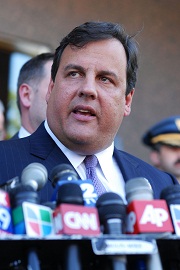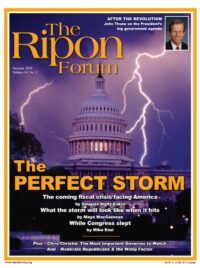 Voters aren’t stupid. But they often don’t pay attention to the details of public policy, especially at the state level. That’s why, when a forceful political leader comes along and points out the obvious, big things can happen fast.
Voters aren’t stupid. But they often don’t pay attention to the details of public policy, especially at the state level. That’s why, when a forceful political leader comes along and points out the obvious, big things can happen fast.
We’ve seldom seen a better example of such rapid change than the dramatic steps Republican Governor Chris Christie has forced through in New Jersey. Just six months in office, Christie has established himself as the most important governor to watch as states wrestle with budget woes that will require years of yet-unidentified changes in fiscal policy to resolve. He’s done it the old-fashioned way: Using the public power of the chief executive’s office to educate citizens about the causes of the problem, promoting what most voters consider common-sense solutions, and insisting that the Legislature agree to reforms that entrenched opposition previously made impossible.
Christie won voter support for what turned out to be a comfortable victory over Democratic incumbent Jon Corzine by campaigning primarily on spending and tax issues, with a special emphasis on New Jersey’s notoriously high property taxes. Of the 10 counties nationwide where property taxes are highest as a proportion of homeowner income, six are in the Garden State, according to the nonpartisan Tax Foundation (the other four are in New York). In a review of his successful electoral strategy, The New York Times cited the state’s “suffocating tax burden” as a primary challenge facing the incoming governor.
What makes Christie unique? The ambitious scale of his program to limit spending. An aggressive style that includes taking on the most powerful interests in the state – the public employee unions, especially the teachers. And finally, a record of one unexpected victory after another.
But what makes this new chief executive especially important isn’t that he faces unique budget problems. Precisely the opposite: Virtually every state confronts the challenges Governor Christie is attacking so aggressively.
What makes Christie unique? The ambitious scale of his program to limit spending. An aggressive style that includes taking on the most powerful interests in the state – the public employee unions, especially the teachers. And finally, a record of one unexpected victory after another.
Pushing the Envelope
From a short-term perspective, the states’ budget gaps are driven by historic drops in revenue, caused in turn by the recent deep recession and slow recovery. Starting with the final three months of 2008, overall tax revenues to the states fell on a year-over-year basis for five straight quarters – a decline not seen since at least the Great Depression. The Rockefeller Institute of Government reported in July that the start of 2010 finally brought an increase in revenues. That was largely the result of legislated tax increases in New York and California, though. Overall collections were still down by more than 9 percent from two years earlier.
Research from the Government Accountability Office (GAO) and elsewhere makes clear that the tough fiscal times for state and local governments will not end soon. Full recovery from recent revenue losses may take several years. By 2015, according to GAO’s projections, the state-local sector will be well into a long-term deterioration of overall fiscal balance caused largely by rising costs for health care, including benefits for public employees and retirees. Over the next two to three decades, state and local officials would need to raise taxes, restrain spending, and/or find cost efficiencies valued at $350 billion or so in today’s dollars to eliminate the gaps projected by GAO. For context, that’s equivalent to more than half of all spending on K-12 education, or all state-local sales taxes and corporate income taxes combined.
To be sure, the immediate crisis confronting Christie when he took office this January was among the worst in the country. State officials estimated the gap between projected revenues and expenditures at more than $10 billion, on a prior-year basis of $29 billion. As is the case in many states, recent years’ fiscal plans had been balanced with gimmicks or one-time revenues (such as $700 million from a tax amnesty plan), and use of extraordinary federal aid with no plan for when the Washington stimulus ends.
The Christie approach to closing the gap began immediately with executive action to reduce spending for the fiscal year ending June 30. The governor’s office in New Jersey is institutionally among the strongest in the nation, with budgetary and appointment powers many other top elected officials lack. Even with that authority, Christie pushed the envelope of his executive powers to eliminate – without legislative approval – billions in expenditures that his predecessor and the Legislature had approved seven months earlier.
…Christie pushed the envelope of his executive powers to eliminate – without legislative approval – billions in expenditures that his predecessor and the Legislature had approved seven months earlier.
His March budget proposal for the current year went further. It called for reducing overall spending by more than 8 percent, including cuts to politically sensitive areas such as education and health care. Having promised to retain popular property-tax relief checks for homeowners, Christie said the state would simply “take a break” for a year and restore the payments in 2011. He even spread the political blame for some budget-busting actions of the past, citing “the unwarranted 9 percent pension increase granted by Republicans in 2001 but never paid for by either party.”
Making a particularly risky investment of political capital, Christie told voters in April they should take a stand against school spending by voting against local education budgets. The result: voter turnout in school elections rose sharply, and 58 percent of budgets were defeated – the largest rejection rate in 35 years.
The focus on education spending and budget cuts didn’t endear the Governor to public-employee unions. A highly publicized internal memo from a teacher union official seemed to ask for divine intervention to bring Christie to his eternal reward quickly (the union leader said the prayer was a bad joke).
But it backfired, building the Governor’s political standing – and thus his ability to sway the Legislature – even further.
Making the Sale
Christie was pushing for legislative action on a constitutional amendment imposing a 2.5 percent annual limit on local property tax increases. The Legislature instead approved a 2.9 percent statutory limit – thus leaving room for future legislated changes to the limit – along with a number of exceptions to the cap.
“We’re willing to compromise, but the Governor hasn’t shown that willingness,” the Democratic Senate president, Stephen M. Sweeney, said in late June.
Christie went into campaign mode again, touring the state and visiting homeowners to build public pressure. Barely two weeks later, both houses of the Legislature had approved a compromise measure that was statutory only (as the Legislature sought), but capped increases at 2 percent (cutting the existing cap in half, below even the Governor’s proposal) and allowing local voters to override the statewide limit if they choose.
As he told the crowd in an Ocean County community center, “You ain’t seen nothing yet.”
The ultimate effect of that compromise remains to be determined. And, clearly, Governor Christie has not been able to resolve the budget problems entirely. Perhaps most troubling, this year’s budget makes no provision for funding employee pensions – an omission that critics say means shifting $3 billion in expenses to the future, with no identifiable plan to cover the cost. And projections show a $10 billion budget gap approaching in 2011.
But this Governor has only just begun. Marking his six month anniversary in office in mid-July, Christie renewed the call for major pension reforms and steps to help local governments cope with reduced revenues.
As he told the crowd in an Ocean County community center, “You ain’t seen nothing yet.” For this new master of the bully pulpit, that sounds about right. RF
 Robert B. Ward is deputy director of the Nelson A. Rockefeller Institute of Government, at the State University of New York’s University of Albany.
Robert B. Ward is deputy director of the Nelson A. Rockefeller Institute of Government, at the State University of New York’s University of Albany.




